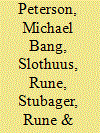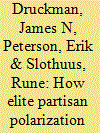| Srl | Item |
| 1 |
ID:
102562


|
|
|
|
|
| Publication |
2011.
|
| Summary/Abstract |
Public attitudes towards welfare policy are often explained by political values and perceptions of deservingness of welfare recipients. This article addresses how the impact of values and perceptions varies depending on the contextual information that citizens have available when forming welfare opinions. It is argued that whenever citizens face deservingness-relevant cues in public debate or the media, a psychological 'deservingness heuristic' is triggered prompting individuals spontaneously to think about welfare policy in terms of who deserves help. This is an automatic process, equally influential among the least and the most politically sophisticated. Moreover, when clear deservingness cues are present, the impact of values on opinions vanishes. These arguments are supported by data from two novel experimental studies embedded in separate nationwide opinion surveys. The findings revise conventional wisdom of how values and heuristics influence public opinion and have major implications for understanding dynamics in aggregate welfare opinion and attempts from political elites to manipulate public opinion.
|
|
|
|
|
|
|
|
|
|
|
|
|
|
|
|
| 2 |
ID:
121090


|
|
|
|
|
| Publication |
2013.
|
| Summary/Abstract |
Competition is a defining element of democracy. One of the most noteworthy events over the last quarter-century in U.S. politics is the change in the nature of elite party competition: The parties have become increasingly polarized. Scholars and pundits actively debate how these elite patterns influence polarization among the public (e.g., have citizens also become more ideologically polarized?). Yet, few have addressed what we see as perhaps more fundamental questions: Has elite polarization altered the way citizens arrive at their policy opinions in the first place and, if so, in what ways? We address these questions with a theory and two survey experiments (on the issues of drilling and immigration). We find stark evidence that polarized environments fundamentally change how citizens make decisions. Specifically, polarization intensifies the impact of party endorsements on opinions, decreases the impact of substantive information and, perhaps ironically, stimulates greater confidence in those-less substantively grounded-opinions. We discuss the implications for public opinion formation and the nature of democratic competition.
|
|
|
|
|
|
|
|
|
|
|
|
|
|
|
|